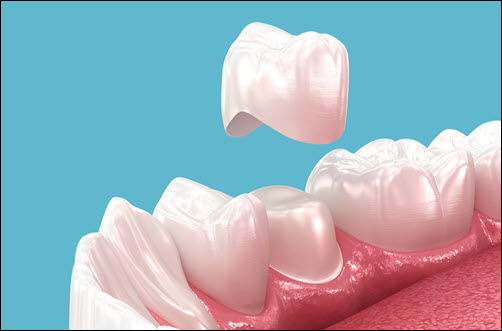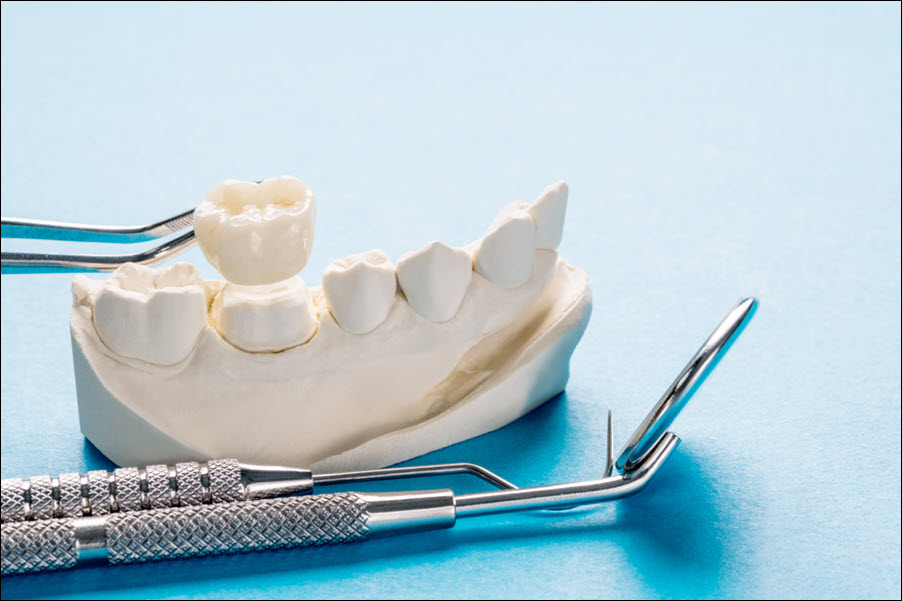Dental crowns restore damaged teeth and improve smile appearance. Crowns cover and protect teeth weakened by decay, fractures, or large fillings. Dentists shape crowns to match natural teeth, improving both function and appearance. Crowns strengthen teeth, improve bite alignment, and protect against further damage. Made from porcelain, ceramic, or metal, crowns resist wear and last for years. The natural color and texture of porcelain crowns create a seamless look. Crowns also cover discoloration and misshapen teeth, improving smile balance. Understanding the benefits of dental crowns helps you decide if they’re right for you. Let’s explore how dental crowns enhance and protect your smile.
What Are Dental Crowns?
 Dental crowns are custom-made caps that cover the entire surface of a tooth. Dentists use them to restore strength, shape, and appearance. Crowns protect weak teeth from cracking and breaking. They also restore teeth after root canals and large fillings. Dentists prepare the tooth by reshaping it to create a stable base. The crown fits over the prepared tooth and is bonded with dental cement. Crowns made from porcelain or ceramic match the color of natural teeth. Metal crowns offer extra strength for back teeth. Dental crowns provide long-lasting protection and improve smile appearance. Stronger teeth increase chewing strength and overall comfort.
Dental crowns are custom-made caps that cover the entire surface of a tooth. Dentists use them to restore strength, shape, and appearance. Crowns protect weak teeth from cracking and breaking. They also restore teeth after root canals and large fillings. Dentists prepare the tooth by reshaping it to create a stable base. The crown fits over the prepared tooth and is bonded with dental cement. Crowns made from porcelain or ceramic match the color of natural teeth. Metal crowns offer extra strength for back teeth. Dental crowns provide long-lasting protection and improve smile appearance. Stronger teeth increase chewing strength and overall comfort.
Benefits of Dental Crowns
Crowns strengthen weakened teeth, preventing fractures and tooth loss. They restore natural tooth shape and improve bite alignment. Crowns cover chips, cracks, and deep stains that whitening treatments cannot fix. Porcelain and ceramic crowns match the color and texture of natural teeth. Crowns improve chewing ability and reduce sensitivity to hot and cold foods. Unlike fillings, crowns cover the entire tooth, providing better protection. Crowns also improve speech clarity by correcting bite issues. Stronger tooth structure reduces jaw strain and increases overall comfort. Improved tooth appearance increases smile confidence. Crowns provide a natural, polished look that lasts for years.
The Dental Crown Procedure
The dental crown procedure usually takes two visits. During the first visit, the dentist numbs the tooth and reshapes it to create a stable base. A digital scan or mold captures the tooth’s shape for a custom fit. A temporary crown protects the tooth while the permanent crown is made. At the second visit, the dentist removes the temporary crown and places the permanent one. Dental cement bonds the crown securely to the tooth. The dentist polishes the crown for a natural look and smooth finish. The entire process takes about two weeks. Patients can eat and drink normally shortly after placement.
Types of Dental Crowns
Porcelain and ceramic crowns match the color and texture of natural teeth. They provide a seamless look for front teeth. Metal crowns, including gold and silver, offer extra strength for molars. Porcelain-fused-to-metal crowns combine the strength of metal with the appearance of porcelain. Zirconia crowns provide durability and a natural finish. Resin crowns are more affordable but wear down faster. Dentists recommend different crown types based on tooth location and patient preferences. Porcelain and zirconia crowns resist staining and provide long-term durability. Choosing the right material improves both function and smile appearance. Proper crown selection increases comfort and chewing strength.
How to Care for Dental Crowns
Brushing and flossing daily protect crowns and surrounding teeth from plaque buildup. Use a soft-bristled toothbrush and non-abrasive toothpaste to avoid scratching the crown. Floss gently around the crown to prevent gum inflammation and decay. Avoid chewing on hard objects like ice and pens to prevent crown damage. Regular dental checkups allow dentists to monitor crown health and adjust bite alignment. If the crown feels loose or uncomfortable, contact your dentist immediately. Mouthguards protect crowns from grinding and clenching. Proper care increases crown lifespan and maintains a strong, healthy smile. Consistent oral hygiene ensures long-lasting crown protection.
Who Benefits from Dental Crowns?
Patients with cracked, chipped, or weakened teeth benefit from dental crowns. Crowns protect teeth after root canals and large fillings. Patients with deep discoloration or misshapen teeth improve smile appearance with crowns. Crowns also help patients with bite issues and jaw strain. People who grind their teeth benefit from the added strength of crowns. Crowns restore tooth structure and improve chewing comfort. Improved tooth alignment reduces jaw tension and increases speaking clarity. Crowns provide a durable, natural-looking solution for damaged or discolored teeth. Stronger teeth increase smile confidence and overall comfort. Crowns improve both dental health and smile aesthetics.
Dental crowns restore tooth strength and improve smile appearance. They protect weakened teeth from fractures and decay. Crowns cover chips, cracks, and stains, creating a polished, natural look. The procedure is quick and comfortable, providing long-lasting protection. Porcelain and ceramic crowns match natural teeth for a seamless finish. Proper care extends crown lifespan and maintains overall dental health. Crowns improve bite strength, chewing comfort, and speaking clarity. Investing in dental crowns enhances both dental function and smile confidence. Stronger teeth create a healthier, more attractive smile. Dental crowns provide a durable, natural-looking solution for long-term oral health.

